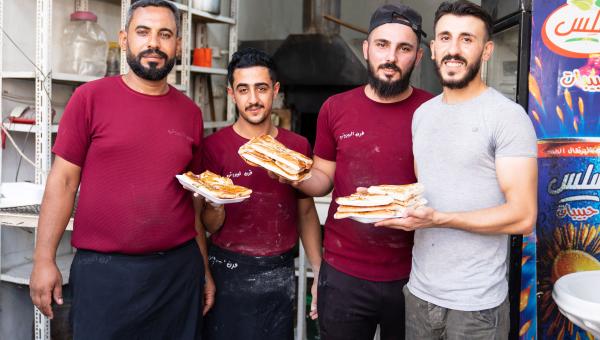
Our focus
Gender Equality and Women Empowerment
What we do
The protracted conflict in Syria has caused immense devastation and loss of life. The physical infrastructure was destroyed in many areas, and economic systems and social fabric weakened. The basic needs of shelter, water, electricity and food security were further threatened following the February 2023 earthquakes, worsening prospects for recovery and deepening the needs of women and girls. Impacted by the multiple shocks, women’s ability to access health, education and infrastructure services is diminishing, their exposure and violence risks are increasing along with imbalanced power relations. Women’s ownership rights and access to economic opportunities are also declining.
UNDP is making efforts through various initiatives to address gender inequalities in Syria, setting the foundational work that will contribute to longer-term change on the ground. UNDP’s approach and pragmatic application align with community needs, focusing on integrating gender and promoting women’s empowerment and agency.
UNDP’s interventions with respect to women’s empowerment, improved access to resources, services, economic activities, rights and knowledge have all provided opportunities for women to realise their full potential.
As a catalyst of change, UNDP is supporting women to assume a more active role in their communities by facilitating access to information and bringing their voices to governing structures and decision-making processes. Women groups, for example, have broken barriers across conflicting communities to extend support during the earthquake’s aftermath.
Similarly, women who benefited from livelihood programmes and renewal energy training relied on each other for support and consultations, resulting in transformative change in their lives and the lives of their families. Engaging women and introducing them to new smart technologies is enhancing their role in agriculture, despite them not being the owners of the land.
Women’s access to training opportunities, finance and income-generating activities as well as mental health and psychosocial support services have all contributed to supporting their recovery process. Initiatives relating to social cohesion and managing psychosocial distress have been widely welcomed in the community and were perceived as essential for some women who are victims of domestic and public violence.
Moreover, initiatives within the rule of law programme have helped bring justice to communities as lawyers and individuals take the lead in resolving local conflicts.
Communities in Syria continue to struggle to cope with the impact of the conflict on their lives at a time when the circumstances are dire. Boot camps, workshops and the Fadfada platform (mental health and psychosocial support platform that provides guidance and potential referral to services as needed) all provide outlets for women and youth (both young women and men) to acquire new perspectives, benefit from services and eventually shape their own lives.
The potential of UNDP Syria to expand its role in advancing the Gender Equality and Women Empowerment (GEWE) agenda locally is high. UNDP Syria’s work, as part of the UN Gender Task Force, is triggering more targeted collaboration to promote women’s agency and pave the way for strategic transformative change at the macro and micro levels. Additionally, UNDP Syria staff members are critical in ensuring that opportunities to address gender inequalities are optimized. After an initial investment in building staff knowledge and skills to identify gender issues, interest in integrating gender increased, and the demand for additional guiding tools is emerging. The gender champions initiative also has the potential to facilitate gender integration across programmes and areas of engagement.
Gender Equality Seal programme
In 2021, UNDP Syria applied for the Gender Equality Seal for the period of 2021-2023, aiming to accelerate transformative efforts towards gender equality and women’s economic and social empowerment through the facilitation of access and mobility to empowerment, skills and training activities, access to basic and protection services, and meaningful participation in critical dialogue at the local, regional, and national level. Moving forward, UNDP Syria is taking major steps in partnership with 25 UNDP gender champions to advance gender equality and women’s empowerment in management, capacities, enabling environment, knowledge management, programmes, partnerships, and gender results/impact, the gender seal seven pillars.
49%
of the population are female
3.2
Million
Girls need education assistance
2.1
Million
Women need nutritional assistance
1.62
Million
Women are internally displaced
7.9
Million
Women in need of GBV assistance
4.5
Million
Women are in need of humanitarian assistance
Learn more

 Locations
Locations




